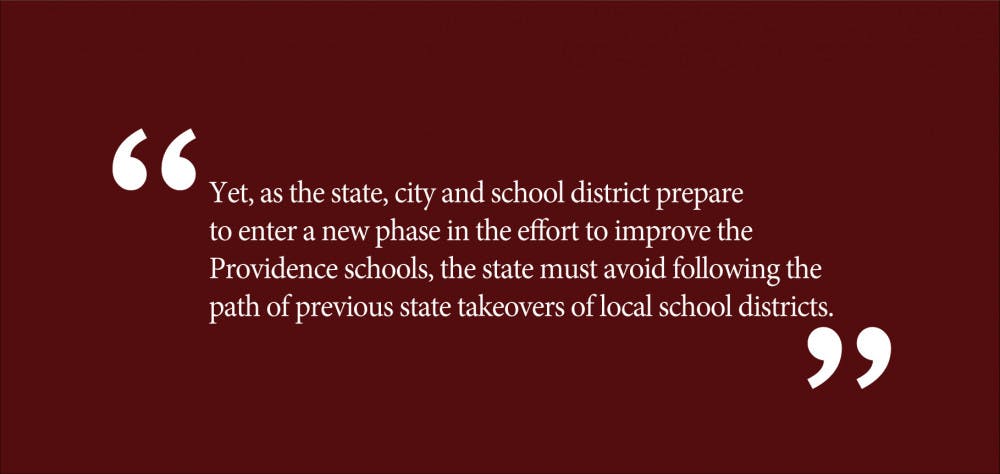In early November, the state of Rhode Island took control of the Providence Public School District. The takeover came after the release of the “Johns Hopkins Report,” which detailed the district’s academic challenges as well as the bureaucratic problems that have hindered the management of the district.
As a graduate of Central High School in Providence and a member of the Johns Hopkins review team, I can attest to the district’s current and enduring challenges. Yet, as the state, city and school district prepare to enter a new phase in the effort to improve the Providence schools, the state must avoid following the path of previous state takeovers of local school districts.
The first state takeover of a local school district occurred in 1989 when New Jersey took over the Jersey City schools. Since then, there have been over 100 state takeovers of school districts across the country. In every case, state authorities express the need for improvement and promise to deliver a better system of education. However, we have 30 years of evidence to show that states often fail to produce the type of improvement that they promise and communities expect.
My research shows that takeovers often lead to the political disempowerment of communities by separating the schools from the communities they serve. Schools are the foundation of a community. For communities of color, the struggle to the right to an education has always involved a collective, community effort. Communities of color fought collectively for access to education, adequate funding for low-resourced schools, Black and Latinx teachers and administrators and curricula that reflect the presence and contributions of marginalized people.
However, communities of color — the communities most likely to experience a state takeover of their local schools — often lose their ability to collectively influence schooling decisions. In most cases, the local school board is abolished and the authority of deciding who leads the school district, who teaches its children and what the curriculum should look like shifts to state officials who make decisions without the consent of the community. Thus, while state takeovers have a weak record on school improvement, they have a substantial record of disenfranchising communities, particularly communities of color.
Although the state of Rhode Island has taken over the Providence schools, it does not have to follow the path of previous state interventions. Rather than further alienating the community from its schools, as state takeovers are prone to do, the state can help the community build stronger ties to its schools. In fact, there are several indicators that this intervention may be different. Unlike other cities, the Providence mayor, city council and school board did not object to the takeover. From public accounts, Mayor Jorge Elorza has been working collaboratively with Governor Gina Raimondo and State Education Commissioner Angélica Infante-Green on a plan to improve the schools. The school board has not been abolished and the school board president has been supportive of the takeover. The City Council President, Sabina Matos, and the majority of the city council have also supported the takeover. While student and community groups opposed the process of the takeover, which in their view did not include an adequate role for student and community groups in the process, they were not opposed to the actual takeover. Indeed, when the turnover plan was released to the public, the student and community groups expressed satisfaction with the Commissioner’s plan.
The absence of objection from the local elected officials, parents, students and community groups suggests that there is a collaborative element here that is not associated with other takeovers. However, the early signs of collaboration between stakeholders should not be viewed or interpreted as an abdication of the community’s role in improving the Providence schools. The path to improving the Providence schools must be paved by a vigorous public, fully engaged in its schools, not by a single commissioner or superintendent.
Building mechanisms where the public is involved in the decision-making over its own schools is the only way to build a robust system of public education that serves all Providence students. In that endeavor, we have a collective responsibility. For us at Brown University, that means that we adequately support the schools, share our research and work closely with the community with the foundational principle that the children, parents and community groups in Providence are the strength of the schools, not a liability.
Domingo Morel PhD’14 is a Visiting Scholar at the Annenberg Institute for School Reform at Brown University and an assistant professor of political science at Rutgers University, Newark. He is the author of “Takeover: Race, Education, and American Democracy.” Domingo Morel can be reached at domingo.morel@rutgers.edu. Please send responses to this opinion to letters@browndailyherald.com and op-eds to opinions@browndailyherald.com.





